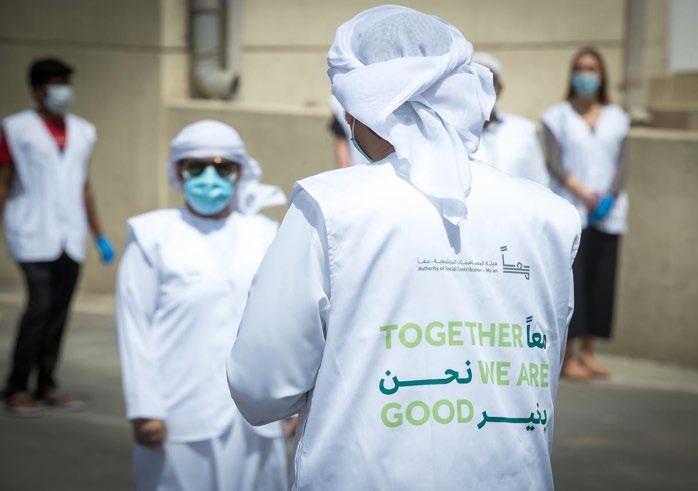
2 minute read
2.1 Impact of COVID-19 on Abu Dhabi
TWAG at a Glance
2.1 Impact of COVID-19 on Abu Dhabi
Advertisement
Worldwide, the pandemic has led to a dramatic loss of human life, brought about devastating social and economic disruptions and presented an unprecedented challenge to public health, food systems, the economy and the world of work. Countries have struggled to address the scale of the COVID-19 outbreak and its widespread effect on individuals, businesses and national economies.
The relief efforts began with central banks and governments rolling out fiscal stimulus and relief packages, as well as policy measures to mitigate the economic downturn. In the wake of COVID-19, authorities implemented an aggressive containment strategy with strict lockdowns, postponed major events, imposed social distancing measures, and undertook large-scale testing.1
For citizens and residents of Abu Dhabi, the immediate effects of the pandemic included strict lockdowns and restrictions on movement and gatherings, as authorities tried to limit the human-to-human transmission of the virus. Thousands of people were affected and lost their jobs overnight as numerous businesses found themselves having to lay off many of their workers. This meant that these workers then faced economic hardship as their incomes had been either significantly reduced or completely cut. The COVID-19 crisis has especially taken a heavy toll on low-paid workers, long considered the backbone of the economy in Abu Dhabi. It is estimated that nearly 42% of workers were in high economic risk situations, especially workers in elementary occupations such as cleaners and construction workers (31.7%), and in the services and sales sectors (10.1%).2 During the pandemic, many migrant workers found themselves stranded without the means to return home; they had limited access to financial support and, in the absence of a social safety net, found it difficult to take care of their basic needs. Without the means to earn an income during lockdowns, many were unable to feed themselves or their families. For most, no income means no food or, at best, less food and food that is less nutritious. Many accumulated debts and, without the help and support of charities, would have gone hungry as they waited for work or to be paid.
The economic impact of the pandemic—resulting in lost jobs, isolation and the closure of businesses—is also predicted to have a lasting impact on rates of depression and anxiety within the wider community.
The pandemic also took its particular toll on frontline workers. According to recent research undertaken by government hospital operator SEHA, doctors and nurses working with high-risk patients on COVID wards were the most vulnerable to mental trauma. It might take years for frontline workers to recover from the mental scars they have received from treating seriously ill patients during the coronavirus pandemic.
1 http://pubdocs.worldbank.org/en/879771554825521024/mpo-are.pdf. 2 Statistics Centre of Abu Dhabi, Statistical Yearbook 2020.






